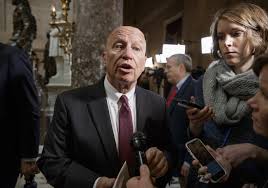Republicans rush approval of tax cut bill

December 13, 2017
A new tax cut bill rushed by the GOP has just been cleared by the Senate. Republicans and Democrats quarreled over the effects and possible aftermath of the proposed bill. Democrats called the tax plan “a godsend to corporations and the rich,” while Republicans claimed the very opposite, maintaining it will “eliminate loopholes used by the wealthy.” President Trump himself said, “vote to cut taxes is a vote to put America first again.”
For the majority of Senators, their frustration has been how they were handed the bill. Early in the morning before the vote, Senators were handed a rewritten version of the proposed 479 page bill.
Under this new bill, the corporate tax rate will be permanently reduced from 35 percent to 20 percent. It will also reduce taxes on foreign profits and exempt all future foreign products from the United States Taxation. Despite claiming to be the party of fiscal responsibility, the bill rushed by Republicans will increase the U.S. budget deficit by $1.4 trillion over a span of 10 years. Regardless, the GOP has insisted that the gap will be reduced by increased economic growth.
For the majority of middle class Americans, the bill has contained both pros and cons. Although taxes will be temporarily cut until 2025, where it will eventually return to their current level, the bill will also eliminate key tax break. Also, standard deductions for individuals and couples will be doubled to $12,000 and $24,000, and many families with children will be eligible for higher tax cuts. Aside from that, the bill is also estimated to increase taxes for more middle class families by 2027.
In addition to that, the bill also includes multiple hidden provisions within it. The first provision has specified that “an unborn child” will be a beneficiary of a college savings plans. It can then be argued whether an embryo/fetus would be categorized as a person, making it harder for many to get abortions.
The bill will also remove the mandate under the affordable care act, which has forced Americans to buy health insurance or pay a penalty.
Alaska’s Arctic National Wildlife refuge, or the ANWR, which has been closed to oil exploration since 1980, will see incentives to begin drilling within the provision which was previously closed off due to concerns of the area’s caribou, polar bear and other ecosystems that may be heavily affected.
Although the bill has been contended heavily, the Republican majority in both the House and the Senate have yet to agree over every aspect of the bill and both houses of government will need to vote on the final draft.






























